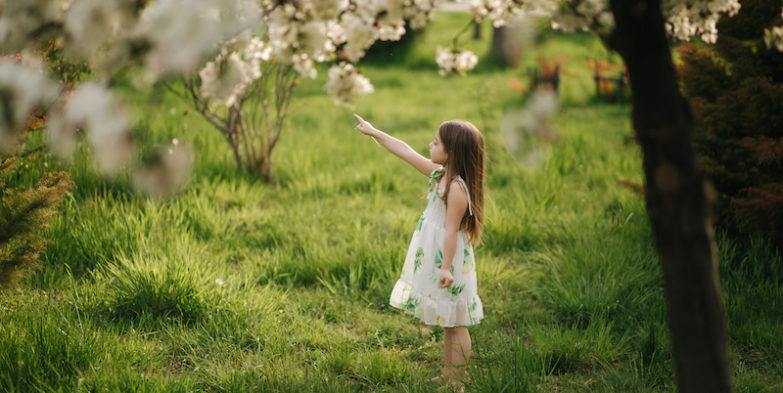I have an empty tree.
For 20 years, every first day of school at Grace, we would line our crew of three little girls in front of the “back-to-school tree,” a crepe myrtle in our backyard that served as the backdrop for my children’s race through childhood, with backpacks brimming with fresh supplies, butterflies in tummies, and the promises each new year brought our lives. Smocked dresses and big bows became snaggle-toothed grins and Crocs, long, awkward limbs and insecure smiles, and finally, cheer and Cougarette gear, patented teen girl eye rolls, and cries of “Mom, please hurry up!” No one year ever transpired the way any of my girls envisioned it standing under that pink-hued tree; God always had a different script. Yet, now, none of them would ever trade His dreams for theirs.
As the years went by, one excited school kid standing before that tree became two, then three, then two, then only one again. The other day, I took that last one to Baylor.
I love all my girls the same, albeit in different ways, as unique creations of our Lord. My oldest is my serious professional with whom I can talk business, religion, and politics. My middle is my partner in comedy, fellow music lover, a guy’s gal, the “son” I never had. And, my youngest, my baby? Well, she’s just my sweetie, the self-proclaimed “daddy’s girl.” The one who gave us a blessing at “parental blessing” time at graduation, thanking us for being her parents and sending her to Grace Community School.
And, the one who hid the note in my Bible so I’d find it the other morning as I had my quiet time.
 It was a kind and gracious thing for her to do, and, as I’ve reflected on it, I want to invite you into the intimacy of her thoughts (with her permission, of course). My wife, Ashley, and I will tell you we have made so many mistakes as parents: mounted up on unimportant things, not given grace where we should have, and become angry at something our kids did because we were actually pridefully embarrassed that it was a poor reflection on us, just to name a few. Yet, when your 18-year-old kid reflects on things she thinks you actually got right, these are probably things worth sharing with people you love, so they can consider whether they’re worth repeating with their own kids. So, here are a few of her thoughts (again, shared with her permission):
It was a kind and gracious thing for her to do, and, as I’ve reflected on it, I want to invite you into the intimacy of her thoughts (with her permission, of course). My wife, Ashley, and I will tell you we have made so many mistakes as parents: mounted up on unimportant things, not given grace where we should have, and become angry at something our kids did because we were actually pridefully embarrassed that it was a poor reflection on us, just to name a few. Yet, when your 18-year-old kid reflects on things she thinks you actually got right, these are probably things worth sharing with people you love, so they can consider whether they’re worth repeating with their own kids. So, here are a few of her thoughts (again, shared with her permission):
“You always seem to understand me even when I don’t understand myself. You cry with me when I need to cry, laugh when I can’t stop laughing, and always humor me by debating when I just want a fight.” I think the most important idea here is to be a good student of your kids. Know their hearts, their minds, their personalities. Know the way they think, and why they think the way they do. Understand how God wired them. I think the DISC, Enneagram, Myers-Briggs, and other models, even though all are limited and only tell part of the picture of these incredibly complex young image-bearers of God in your home, are all helpful in understanding how your kids think, feel, and what they need. Asking lots of questions, deep questions, is also good to help understand how and why your kids think the way they do. They’ll act like they don’t like the questions, maybe even rolling their eyes, but inwardly they love that someone actually wants to know them. You’ll also model what it means to truly know others, not at a surface level or as positions or politics, but for who they really are. What a great thing for the people you’re raising to learn, and you can model it for them as you love them.
“You challenge me to think, to not take anything for what it is but to dig deeper into understanding.” I think it’s really important, particularly in this day and age, that we don’t let our kids be lazy thinkers. It’s a good thing for them to have opinions and ideas, but they need to be able to defend them. We actually teach them to do this through speaking and writing at Grace Community School, but they need to exercise those mental muscles to make them strong. Not so they can win every argument, but so they will know both what they believe and, more importantly, why. There are way too many people, even Christians, with no understanding of God’s Word, and no ability to articulate a sound perspective or argument. While it’s good to respect people’s opinions and tolerate others’ views, they aren’t all equally valid. Some are just bad ideas and not well considered. When they’re young teenagers, most kids will want to banter with you as a way of stretching their wings and asserting their fledgling independence. Engage them in it, but force them to back up what they believe, to “fight” for it. Doing so now will help ensure they won’t be victims to someone else’s bad thinking later on.
“By teaching me to dig deeper, you have showed me how to love others well. People are never difficult because that’s their personality. Everyone has a story.” One of the most challenging, but most powerful things we can do, is to help them develop empathy. Judgment and discernment develop quickly in kids. They know when others do wrong, and they’re quick to judge them. Discernment is important, but it’s only half the battle, and without empathy, can lead to self-righteousness. Empathy takes time and pain, and some people reach adulthood never having any. When our kids see others doing wrong, even when they are the victim of another’s wrongdoing, it’s important that we help them ask “why.” Certainly, we should comfort them and love them through their pain, and step in if there’s a genuine threat, but coaching them through life’s little injustices, asking why the other person is acting that way, develops empathy. What about his or her life is full of pain? What insecurities or fears are they fighting? How is their meanness, or insensitivity, or bad choices, a manifestation of pain and suffering? How can we pray for them, and is there any way to help them? Not only does this process build empathy in kids, but it also helps defuse our desire to step in and fight our children’s battles.
“You have kind of given me a false reality of people because the world says by the way you grew up you should be one of those difficult people, but you’re not. It is such a testament to the Lord.” My youngest doesn’t have a false reality of people; she has an accurate view of the gospel. You may not be the perfect parent. You may, like me, come from a seriously dysfunctional background; pain and heartache may be your legacy. The good news is that Jesus Christ heals, and when we surrender our past to Him, He gives us a new hope and a future. By God’s grace, He decided He was going to turn generational grief into generational blessing in our family, and that He was going to start with me. I don’t know what to do with that, but to just stand before Him with wonder, awe, and humility, falling upon His grace. Every person has a story, and that can be your story, too, even if it isn’t right now. Your Father loves you, and He’s waiting on you.
Even though my tree is empty, my heart is full.
About the Author
 Jay Ferguson, JD, PhD, is the headmaster of Grace Community School, Tyler, Texas. He practiced law for 10 years and, in 2002, joined Grace as development director before assuming the headmaster role in 2003. He’s written extensively on Christian education and training children, including his weekly blog, JaysBlog. He can be reached via email at jferguson@gracetyler.org.
Jay Ferguson, JD, PhD, is the headmaster of Grace Community School, Tyler, Texas. He practiced law for 10 years and, in 2002, joined Grace as development director before assuming the headmaster role in 2003. He’s written extensively on Christian education and training children, including his weekly blog, JaysBlog. He can be reached via email at jferguson@gracetyler.org.

